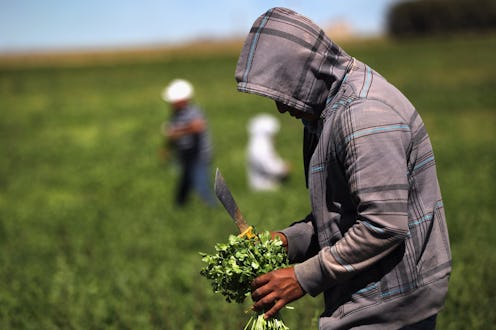News
What You Need To Know About The Cilantro Ban
The Food and Drug Administration has issued a ban on cilantro imported from Mexico, warning it may be contaminated with a parasite after feces and toilet paper were found in fields where the herb is grown. According to the FDA alert, American and Mexican health officials found problems in eight of 11 farms they investigated in Puebla, some of which had no running water or toilet facilities. Authorities are trying to trace the cause of an intestinal sickness called cyclosporiasis, which is caused by the parasite Cyclospora cayetanensis, according to the Centers for Disease Control. It's a nasty intestinal illness that causes diarrhea and vomiting, and some cases may date back as far as 2012, the FDA said.
Infectious diseases expert at Vanderbilt University Medical Center, Dr. William Schaffner told ABC News that tracing cyclosporiasis is tricky because it's not common and it mimics other intestinal diseases. It's hard to diagnose, and not many doctors are aware of it, said Dr. Schaffner. Another problem: Heat from cooking usually kills most parasites, but since we don't generally cook cilantro, that protection is lost. "We use it frequently in salads and it's uncooked and so there's no way you sterilize cilantro," Schaffner said.
Cyclosporiasis caused some 300 people to fall ill in the U.S. last year, most of them in Texas, according to NBC News. An outbreak of the parasitic disease earlier this year hit about 200 people just in Texas, and another outbreak this year has affected at least 205 people in Texas alone.
Most U.S. restaurants don't expect the ban on cilantro to affect them. Chipotle, which uses cilantro in its guac, rice and corn salsa, gets its supply from California, according to Bloomberg News, as does Taco Bell. "We're not getting any cilantro from Puebla (or anywhere else in Mexico) right now, so there is no impact on us," a Chipotle spokesman told Bloomberg News in an email.
If you have cilantro in your pantry, it's almost impossible to determine its country of origin unless it's labeled. In addition to Mexico, cilantro is grown in California and Europe, Yahoo! News reported. Customers can call the store where they purchased any of the herb they have on hand, and ask where they get their cilantro from, to be sure.
How long the ban may remain in effect is still undetermined. And while there's no official recall in place, the best thing to do (besides throwing it away) is to thoroughly wash any cilantro in your kitchen, and ideally, to cook it to kill off any potential parasites, health officials said.
Images: Getty Images (1)
